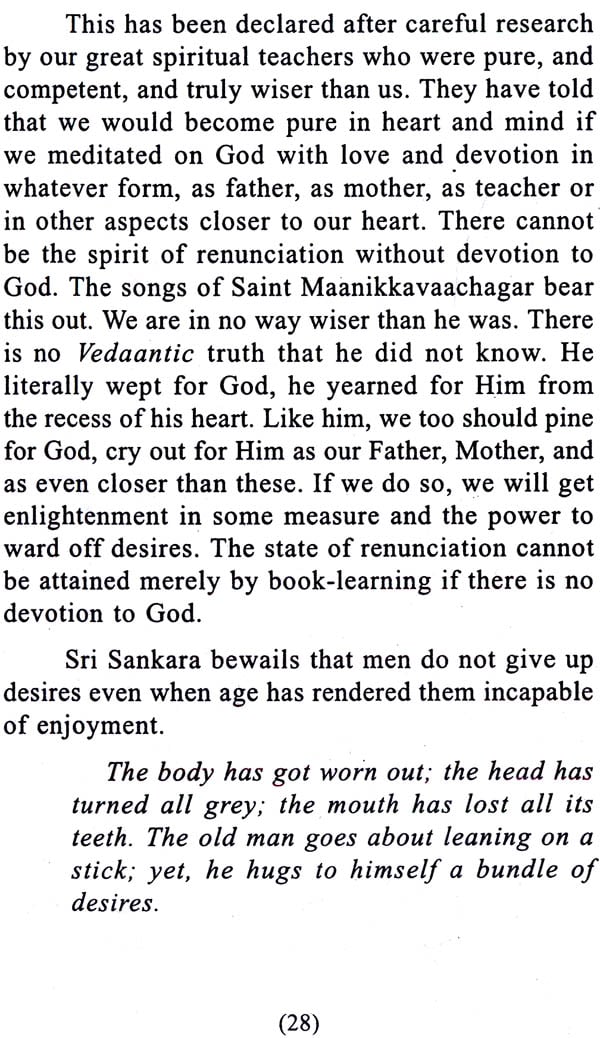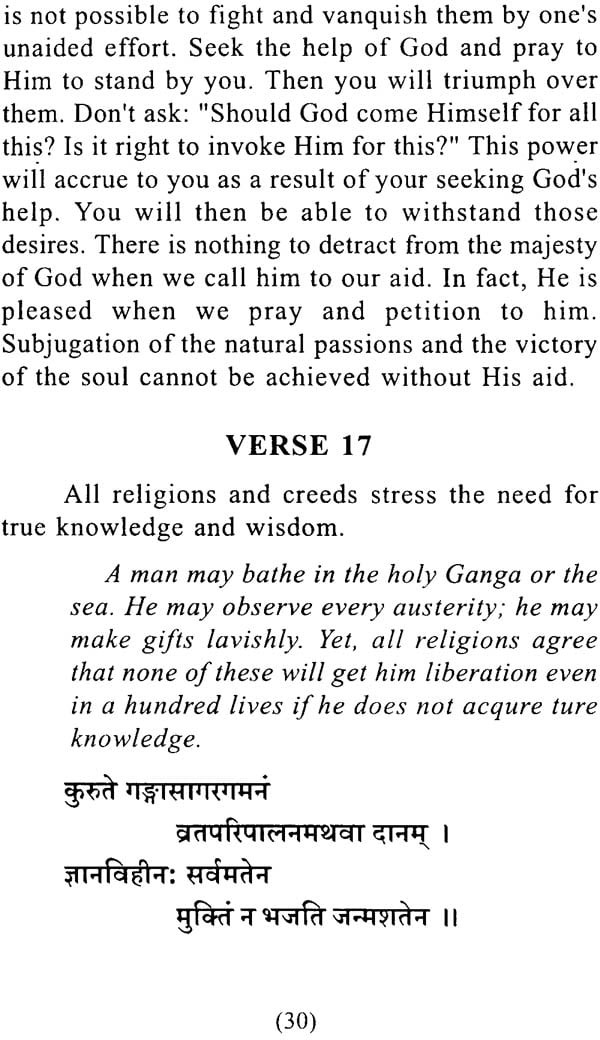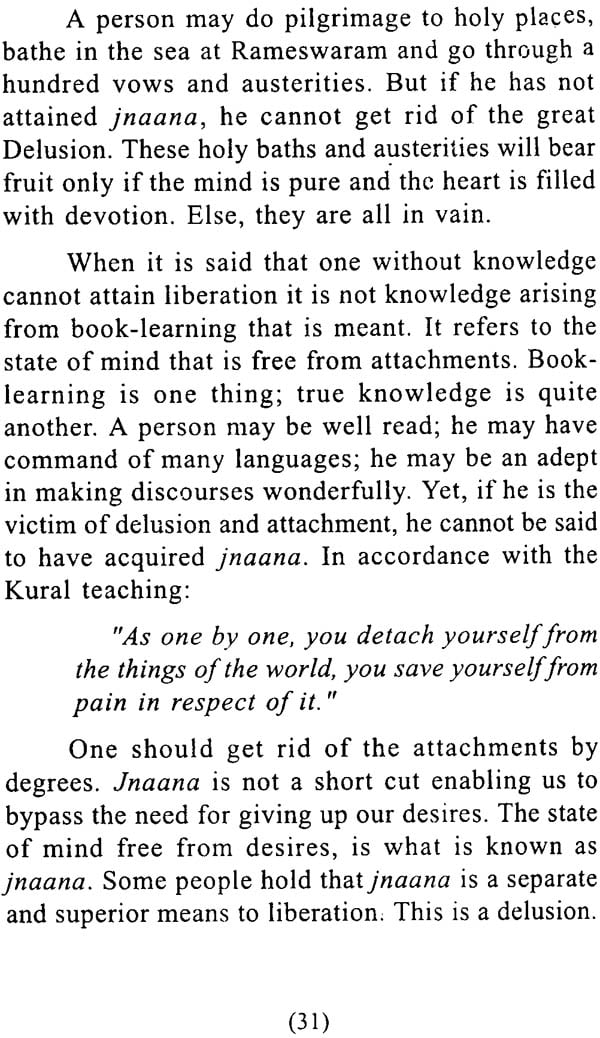
Bhaja Govindam
Book Specification
| Item Code: | IDE161 |
| Author: | Chakravarti Rajagopalachari |
| Publisher: | Bharatiya Vidya Bhavan |
| Language: | English |
| Edition: | 2017 |
| ISBN: | 8172763093 |
| Pages: | 72 |
| Cover: | Paperback |
| Other Details | 7.0" X 4.8" |
| Weight | 80 gm |
Book Description
Chakravarti Rajagopalachari, popularly known as "Rajaji" or "C.R." was a great patriot, astute politician, incisive thinker, great visionary and one of the greatest statesmen of all time. He was a close associate of Mahatma Gandhi, hailed as conscious-keeper of the Mahatma. As an ardent freedom-fighter, as Chief Minister of Madras, as Governor of West Bengal, as Home Minister of India and as the first Indian Governor-General of India, he rendered yeoman service to the nation and left an indelible impress on our contemporary life.
Rajaji was closely associated with Kulapati Munshiji and he was among the distinguished founder-members of the Bhavan. The Bhavan had the privilege of publishing 18 books (see page ii) by him so far, the copyright of which he gifted to the Bhavan.
All of Rajaji's works, especially on Marcus Aurelius, the Bhagavad Gita and Upanishads are popular. In Ramayana and Mahabharata, he has displayed his inimitable flair for story-telling and applying the moral of stories to the needs of modern times.
Rajaji wrote not only in English but also in chaste Tamil, his mother-tongue. He was at his best as a short-story writer. The present book is a translation of some of his stories which open the window into the unsophisticated South Indian homes and ways of life. The reader will be fascinated by their gentle humour and unobtrusive didactic motif.
Rajaji passed away in 1972 at the age of 94.
THE Bharatiya Vidya Bhavan - that Institute of Indian Culture - needed a Book University, a series of books which, if read, would serve the purpose of providing higher education. Particular emphasis, however, was to be put on such literature as revealed the deeper impulsions of India. As a first step, it was decided to bring out in English 100 books, 50 of which were to be taken in hand almost at once.
It is our intention to publish the books we select, not only in English, but also in the following Indian languages: Hindi, Bengali, Gujarati, Marathi, Tamil, Telugu, Kannada and Malayalam.
This scheme, involving the publication of 900 volumes, requires ample funds and an all-India organization. The Bhavan is exerting its utmost to supply them.
The objectives for which the Bhavan stands are the reintegration of Indian culture in the light of modern knowledge and to suit our present-day needs and the resuscitation of its fundamental values in their pristine vigour.
Let me make our goal more explicit:
Wo seek the dignity of man, which necessarily implies the creation of social conditions that allow him freedom to evolve along the lines of his own temperament and capacities; we seek the harmony of individual efforts and social relations, not in any makeshift way, but within the framework of the Moral Order: we seek the creative art of life, by the alchemy of. which human limitations are progressively transmuted, so that man may become the instrument of God, and is able to see Him in all and all in Him.
The world, we feel, is too much with us. Nothing would uplift or inspire us so much as the beauty and aspiration which such books can teach.
In this series, therefore, the literature of India, ancient and modern, will be published in a form easily accessible to all. Books in other literatures of the world, if they illustrate the principles we stand for, will also be included.
This common pool of literature, it is hoped, will enable the reader. eastern or western, to understand and appreciate currents of world thought, as also the movements of the Indian mind, which, though they flow through different linguistic channels, have a common, urge and aspiration.
Fittingly, the Book University's first venture is the Mahabharata, summarized by one of the greatest living Indians, C. Rajagopalachari; the second work is on a section of it, the Gita, by H. V. Divatia, an eminent jurist and a student of philosophy. Centuries ago, it was proclaimed of the Mahabharata: "What is not in it, is nowhere." After twenty-five centuries, we can use the same words about it. He who knows it not, knows not the heights and depths of the soul; he misses the trials and tragedy and the beauty and grandeur of life.
The Mahabharata is not a mere epic; it is a romance, telling the tale of heroic men and women and some who were divine; it is a whole literature in itself, containing a code of life, a philosophy of social and ethical relations, and speculative thought on human problems that is hard to rival; but, above all, it has for its core the Gita, which is, as the world is beginning to find out, the noblest of scriptures and the grandest of sagas in which the climax is reached in the wondrous Apocalypse in the Eleventh Canto.
Through such books alone, the harmonies underlying true culture, I am convinced, will one day reconcile the disorders of modern life.
I thank all those who have helped to make this new branch of the Bhavan's activity successful.









